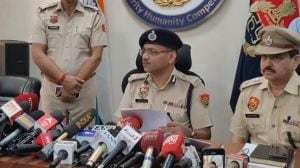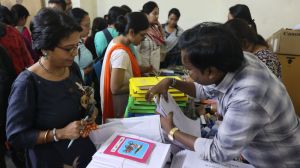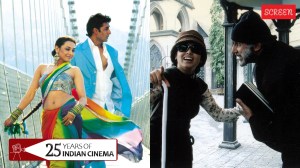Court stays EC ban on TV polls, ads
CHENNAI/NEW DELHI, SEPT 6: The Madras High Court today stayed the August 20 notification of the Election Commission (EC) prohibiting the ...

CHENNAI/NEW DELHI, SEPT 6: The Madras High Court today stayed the August 20 notification of the Election Commission (EC) prohibiting the electronic media from telecasting results of public opinion on polls and advertisements by political parties even as the EC in Delhi refused to comment on the order, saying the matter was sub-judice.
Justice K Govindarajan granted the interim stay on Monday while admitting a writ petition from Sun TV, a unit of Sumangali Publications Private Limited, seeking to declare the notification as illegal and void.
In its writ petition, Sun TV submitted that the EC, which has to supervise the conduct of elections, has no power to pass any order violating the fundamental rights. It derives powers from the Constitution and is controlled by the legislation. It cannot claim any power not given to it under the Constitution or the Laws made by the Parliament.
Political parties and individuals have the right to express their views freely. The Commission’s notification is against thefreedom of speech as guaranteed in the Constitution. The notification cannot be traced to any power given to the EC under Articles 324, 325 and 326 of the Constitution or to any provision of the Representation of People Act.
Newspapers are allowed to advertise appeals of various political parties, candidates and individuals. The electronic and print media have to be treated alike and the electronic media cannot be discriminated. Instead of advancing the cause of free and fair election, the notification has resulted in preventing dissemination of news and views. It has resulted in huge loss to the company, petitioner contended and sought to stay the operation of the proceedings. The interim stay will be in respect of Sun TV only.
Meanwhile in New Delhi, the Election Commission said it had no comments to offer on the Madras HC’s decision saying the matter was sub-judice.
“We do not comment on judicial matters”, Election Commission sources said.
Chief Election Commissioner M S Gill is currently on atour of Kerala and Karnataka to check the security and election arrangements for the second phase of the polls to be held on September 11.
Similar hearings, relating to the EC’s ban on opinion polls are pending with the Andhra Pradesh and the Karnataka High Courts respectively.
The absence of a clearly-defined broadcast regulatory authority has meant that the EC has had to step in and lay down the law on issues relating to the broadcasting of programmes, opinion and exit polls and advertisements on the electronic media.
In its original order calling for a ban on opinion polls and advertisements on the electronic media, the Commission had observed that in a poor country like India, certain checks had to be put in place to ensure a fair and level playing field to all candidates, including those who did not have unlimited means to advertise on television.
Since a related case is also pending before the Supreme Court since the 1998 polls, the Commission has in the past indicated that it is awaitingdirection from the apex court on the matter.
“Sooner or later the Parliament or the judicial system would have to address the matter and make a final determination which the Commission would willingly abide with”, the officials said.



- 01
- 02
- 03
- 04
- 05




























